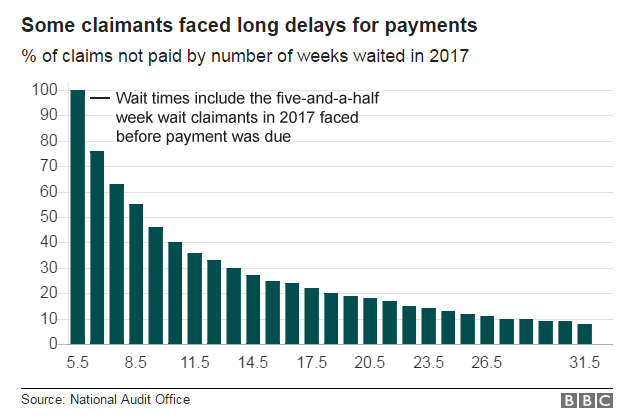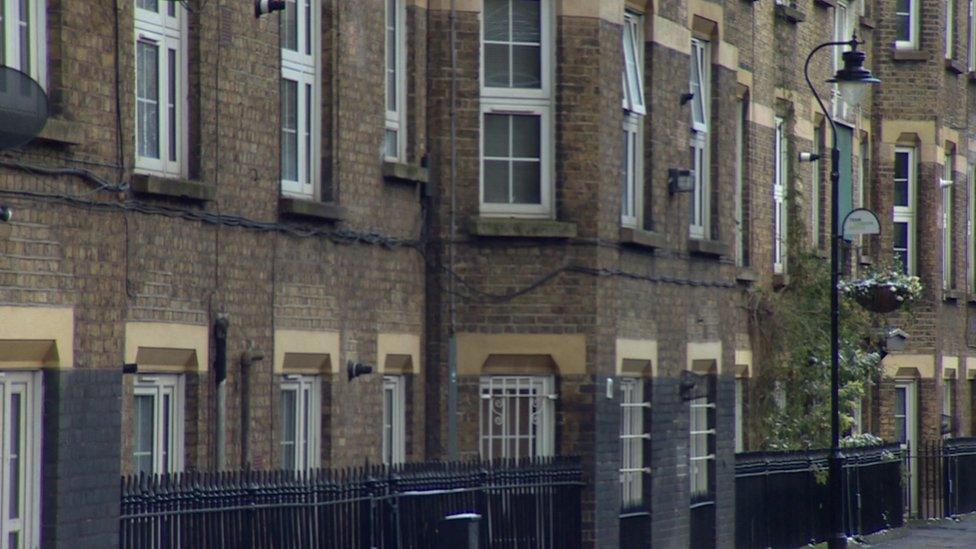Universal Credit 'could cost more than current benefits system'
- Published
- comments
Universal Credit has proved controversial almost from the beginning
The government's flagship benefits system has been too slow to roll out, causes hardship, and is not delivering value for money, a watchdog has said.
The National Audit Office said, external the £1.9bn Universal Credit system could end up costing more to administer than the benefits system it is replacing.
Some claimants waited eight months for payment amid the switch to UC, which rolls six benefits into one, it adds.
The government said UC would bring a £34bn return over 10 years.
It said more people would get into work - and stay there longer - and that it had taken a "listen and learn" approach to the introduction of the programme.
The move to UC has long been criticised for its delayed and flawed implementation, with about 25% (113,000) of new claims in 2017 being paid late.
Universal Credit: 'A horrible place to be'
Sherry Fuller was made redundant last year after working in local government for 17 years and she started on UC one month ago.
She says without the help of friends and family she would be homeless as the payment doesn't cover her essential costs.
"It's a horrible place to be. Very often you are getting so little money that you are having to rely on food banks, having to rely on the goodwill of those around you."
Helen Stephens, from Manchester, also had to borrow from friends and family after waiting over two months for a UC payment and says that badly affected her mental health.
She said: "This drove me to depression as I had never needed anything like that in the past. I felt helpless and worthless.
"It would appear to me that Universal Credit is designed to be very difficult and give people as little as possible."
'Demonstrably failing'
Meg Hillier, chairwoman of the Public Accounts Committee, said UC had been "one long catalogue of delay with huge impact on people's lives".
And the Child Poverty Action Group questioned whether the government should push on with a programme that was "demonstrably failing".
Key findings in the National Audit Office included:
Eight years after work began on UC, only 10% (815,000) of the expected eventual number of claimants are on the system
Some 20% of those paid late - usually the more needy and complicated cases - were waiting five months or more to be paid
Ministers would never know if their aim of putting 200,000 extra people in employment, or saving £2.1bn in fraud and error, would work
Government expectations that UC would deliver £8bn of net benefits annually depended on "unproven assumptions"
UC currently costs £699 per claim - four times as much as the government intends to spend when the systems are fully developed
So many changes had been made to job centres and working practices that there is no "alternative but to continue"
The report noted that "the Department for Work and Pensions does not accept that UC has caused hardship among claimants".
It pointed to a recent internal departmental report that showed 40% of claimants were experiencing financial difficulties.

Analysis of DWP payment data for 2017 revealed late payments were delayed on average by four weeks, but from January to October 2017, 40% of those affected by late payments waited a total of about 11 weeks or more.
Some 20% of this group waited almost five months and about 8% had to wait for eight months.
Despite recent improvements, one-fifth of new claimants in March 2018 did not receive their full entitlement on time. Some 13% received no payment on time.

What is Universal Credit?
Universal Credit merges six benefits (income support; income-based jobseeker's allowance; income-related employment and support allowance; housing benefit; child tax credit; working tax credit) into one.
It was designed to make claiming benefits simpler. A single payment is paid directly into claimants' bank accounts to cover whichever benefits they are eligible for.
Claimants then have to pay costs, such as rent, out of their UC payment. It can be claimed by people whether they are in or out of work - but payment decreases as you earn more.

'Financial misery'
A spokesman for the DWP insisted UC was good value and would realise a return on investment of £34bn over 10 years against a cost of £2bn - with 200,000 more people in work.
"Furthermore, 83% of claimants are satisfied with the service and the majority agree that it 'financially motivates' them to work," he said.
Work and pensions minister Alok Sharma said the NAO report was written before the introduction of £1.5bn-worth of measures enabling people to get 100% advances on their first UC payment.
Mr Sharma told the Today programme those on housing benefit could also get extra money to help them transition on to UC.
"We've not seen the full impact of these very positive changes," he added.
But Jane Ahrends, of the Child Poverty Action Group, said the NAO presented a "justifiably bleak" picture, urging ministers to "pause for thought".
"Will the government press on with a programme that is demonstrably failing - causing financial misery for families - or will it restore the money that's been taken out of Universal Credit in an effort to rehabilitate it for struggling families."
Emma Revie, chief executive of food bank charity The Trussell Trust, called for more support for "groups of people most likely to need a food bank, and debt advice to be offered to everyone moving on to the new system".
Shadow work and pensions secretary Margaret Greenwood said: "This report shows just how disastrously wrong the Conservatives have got the roll out of Universal Credit."
- Published28 February 2018
